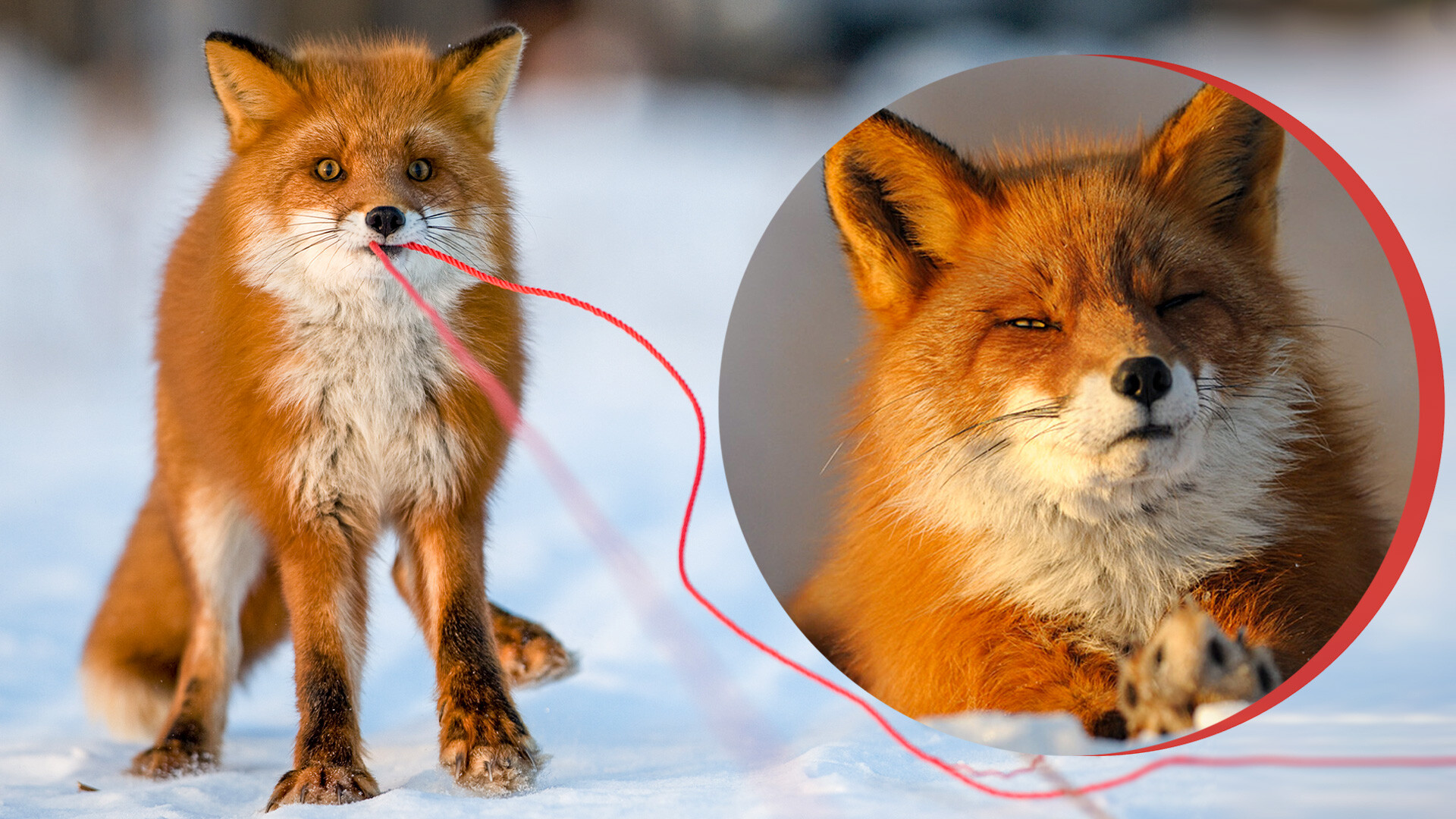
Igor Shpilenok has spent almost his entire life in the woods. In the 1980s, before he was 30 years old, he became a prominent conservation advocate and founded the ‘Bryansky Les’ (Bryansk Woods) conservation park, in Southwest Russia. It was at that time that he got into photography and gained widespread fame across the world for his work. His work is multi-faceted, but wild foxes have taken up a special place in his heart. These clever and communicative animals form the basis of many a curious personal story.
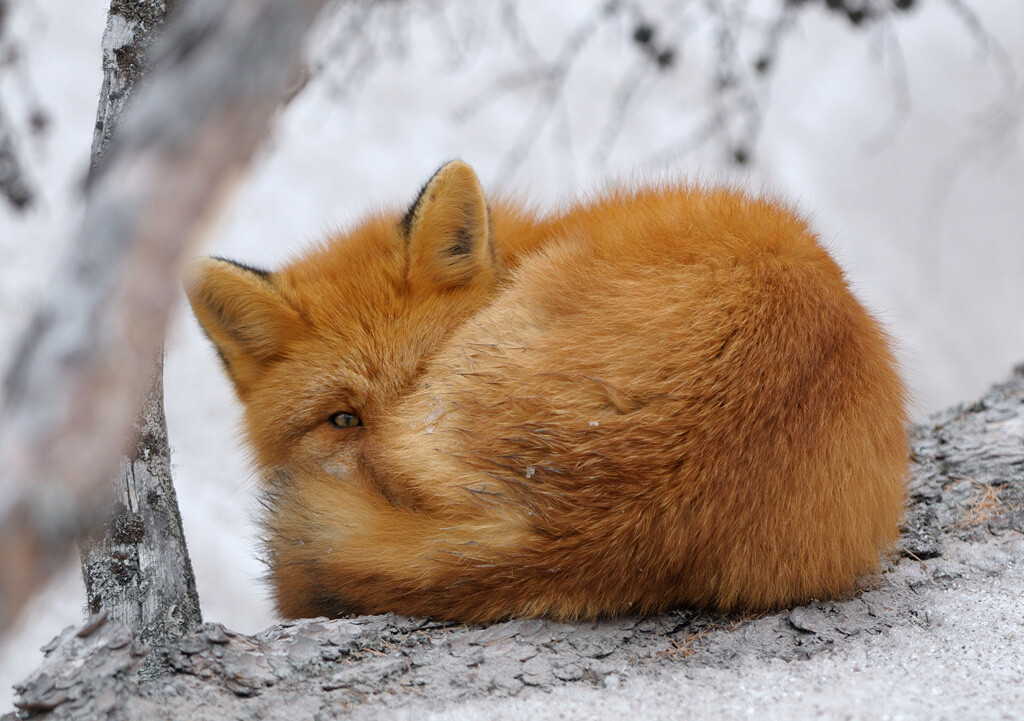
Curled up fox.
Igor Shpilenok1. Looking at the photos, one can’t help wondering how the photographer manages to get so close. Why aren’t these foxes afraid of humans? “In European Russia, foxes are often spotted running away or popping up like a mouse somewhere far off in the fields,” Igor says. “And I try to live in such places, where foxes aren’t that frightened. Plus, I live there for long periods, often leaving home for months or even years at a go. In that time, I managed to make contact with many animals and show that I’m no danger to them. Therefore, after several weeks of caution, foxes begin to treat me as part of nature, sometimes even attempting to domesticate themselves.”
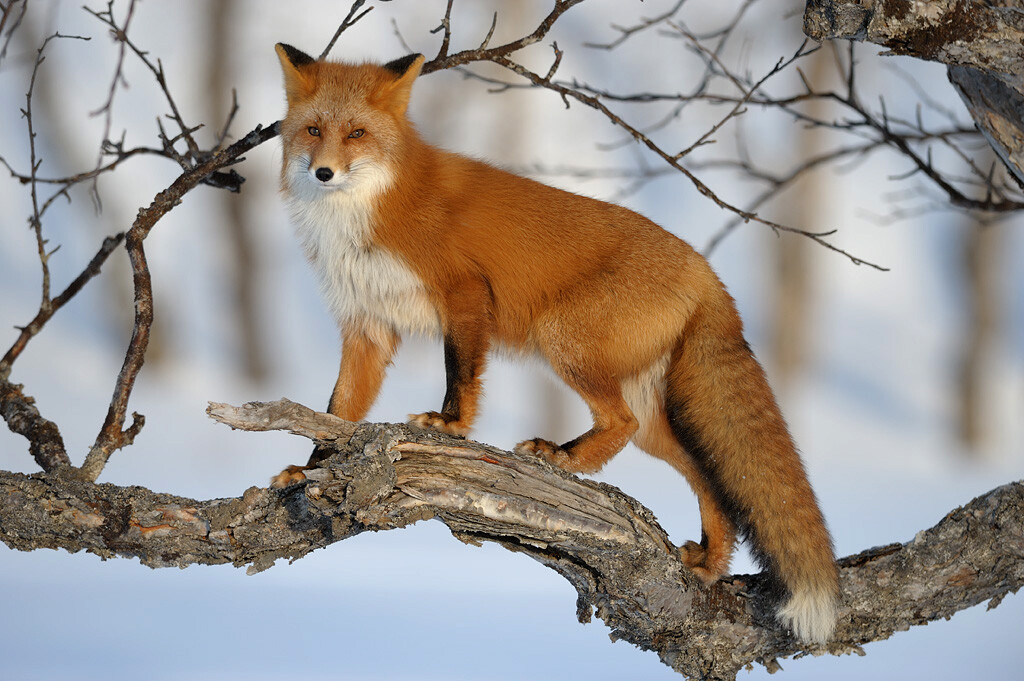
Fox in a tree.
Igor Shpilenok2. “There was a time I experimented by living in the taiga for a whole year without seeing the outside world. I settled in the Kronotsky nature reserve in Kamchatka and foxes came to introduce themselves on the very first day.”
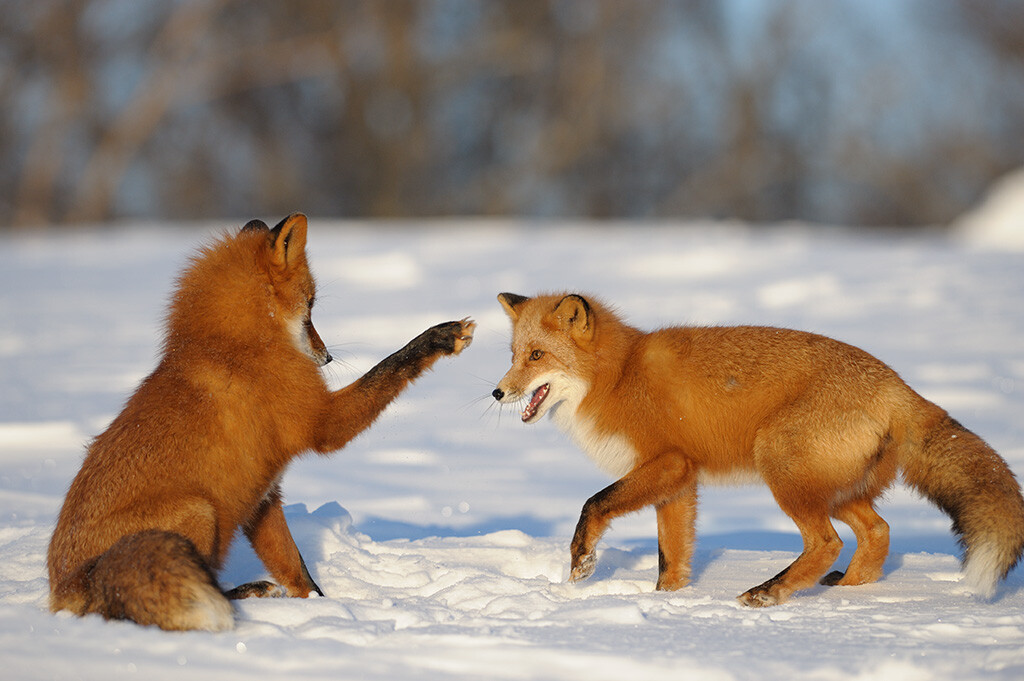
Two Kamchatka foxes.
Igor Shpilenok3. “Several foxes came that year - all very different, each with its own personality and I remember thinking that my favorite was Kuzya, a simple little thief. Then Kuzya got a girlfriend - Alisa - and I took a liking to her, as well. The two then got a neighbor - Zlodey Zlodeich [think of the name as ‘Evil McEvilface’]. It turned out that foxes know how to make people fall in love with them.”
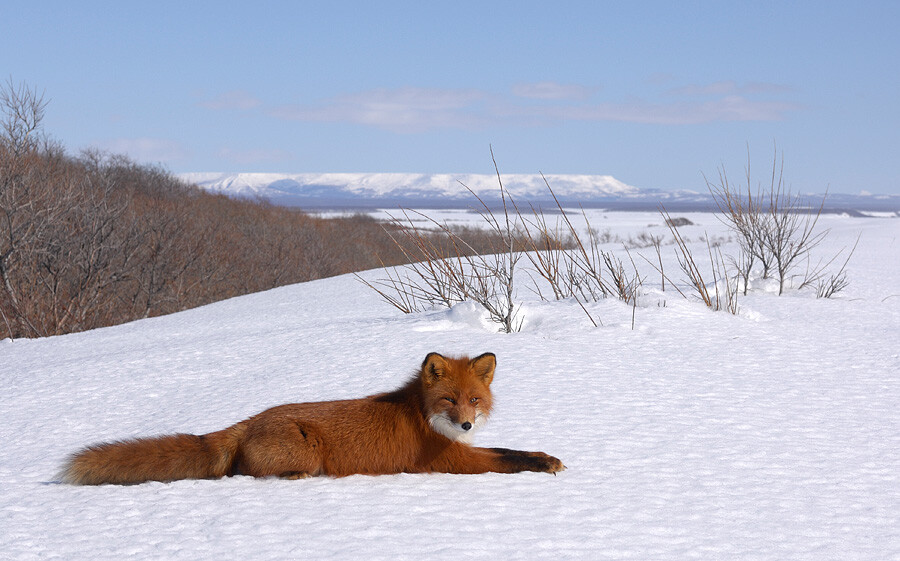
Zlodey Zlodeich.
Igor Shpilenok4. “Foxes are kleptomaniacs - the kinds of things they stole! The most harmless of all were my footwraps. If I laid them out to dry, they’d be gone. They have an instinctual desire to steal whatever they can. Once, they disarmed the reserve inspectors… and these are the kind of guys that aren’t afraid of bears or poachers. They came to my place, placed their boots - three pairs - on the low roof of our dugout and, while they were drinking tea, Zlodey Zlodeich came by and stole everyone’s right shoe. I only found my shoe half a year later, chewed up by bear cubs.”
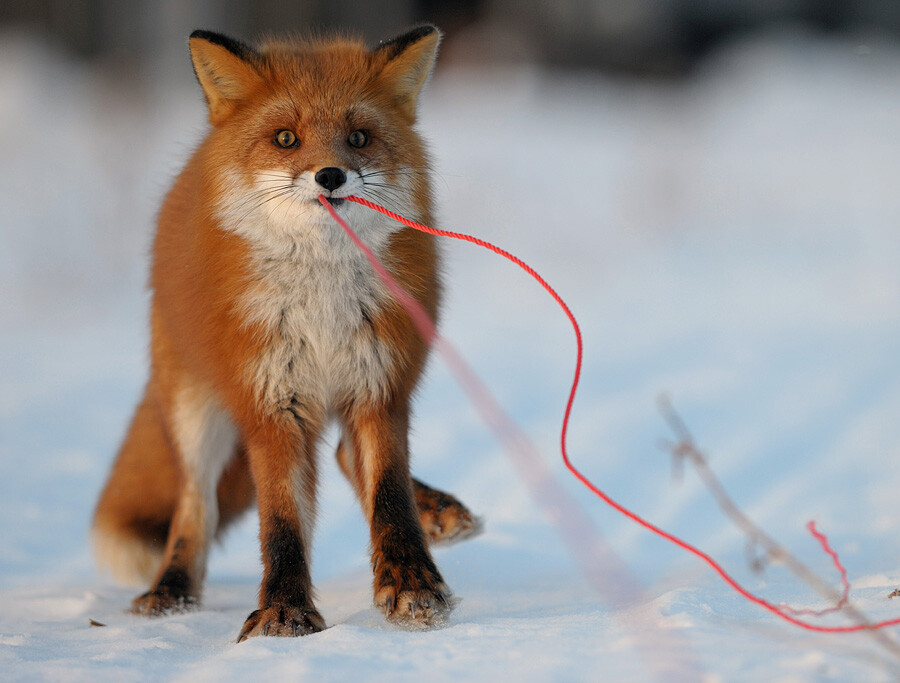
A fox dragging a rope.
Igor Shpilenok5. There was one time when Igor bought an expensive Finnish-made flashlight for his Taiga trip. But his happiness was short-lived. “I went out in the evening to get some firewood, put the flashlight close by and then saw the darkness set in abruptly and my flashlight literally hopped away from me across the tundra really fast,” the photographer says. “The fox grabbed it and made away with it, lighting its path. It hopped around with the flashlight for several hours, before all trace of it vanished. I’ve been buying cheap ones ever since. They don’t steal those for some reason - must be their desire for a beautiful life.”
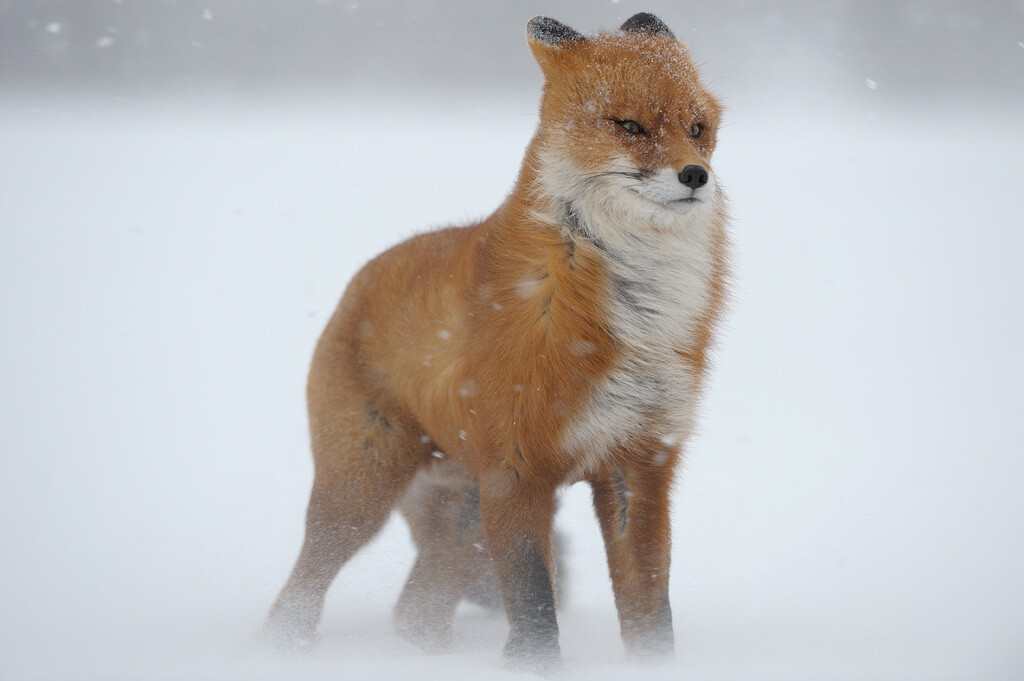
A fox against the wind.
Igor Shpilenok6. Foxes love to be led and have a knack for uniting events into a single whole, the photographer says. “At one point, I didn’t understand their actions. For instance, why Alisa always followed me around. I remember walking in the reserve once and saw this fox and didn’t understand what it wanted from me,” It turned out that Alisa was using Igor as its own hunting dog. Man scares away birds without even noticing it and foxes then get to pick them off.
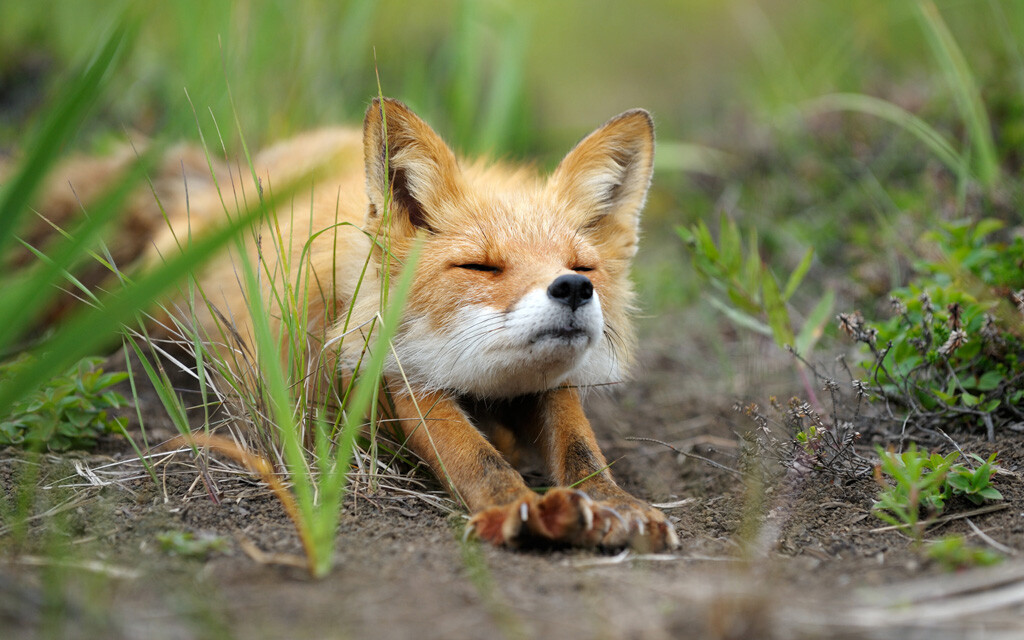
Stretchy time.
Igor Shpilenok7. Sometimes, foxes even use humans as a defense against bears. “There were times when a bear would show an interest in a fox and it would seek shelter under my feet, like a cat,” Igor says.
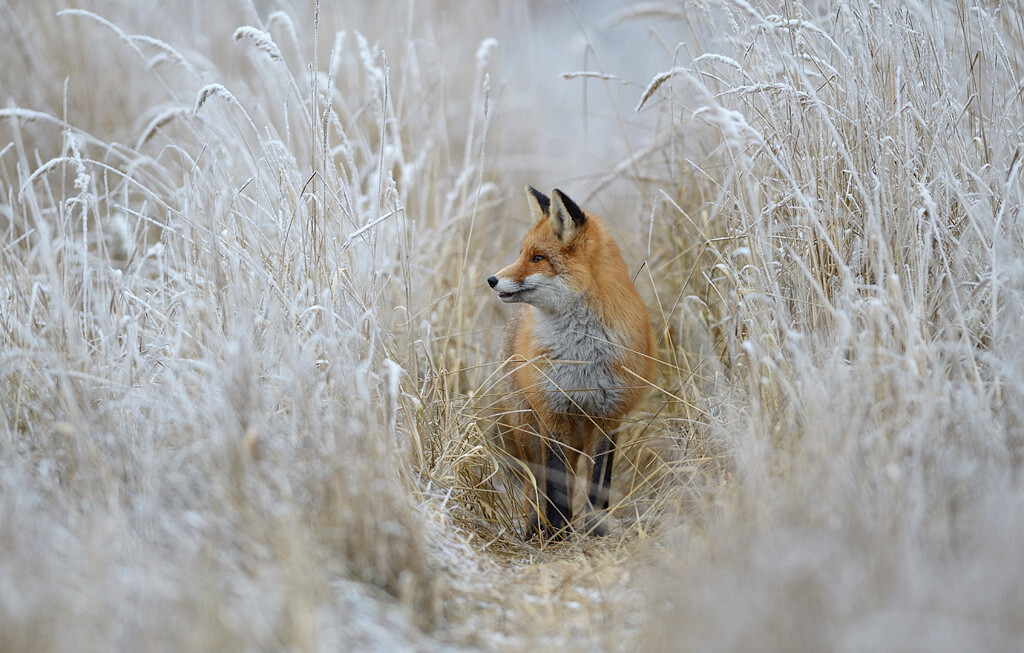
Patrickey the fox.
Igor Shpilenok8. “If you settle in an izba (hut), you immediately get a visit from a fox, sometimes two, and they try to become your ‘dogs’. They don’t bark, only make annoying shrill grunts. But, their behavior is a great indicator of what’s going on around the territory.”
![Ryzhyk [Ginger] the fox.](https://mf.b37mrtl.ru/rbthmedia/images/2022.07/original/62de697e52267d2bc22d1455.jpg)
Ryzhyk [Ginger] the fox.
Igor Shpilenok9. Of course, foxes can see and hear further than a human. You see them looking in a particular direction and can infer that a bear is close by; then another and you can see swans swimming down a river. “To me, they’re just small dots that I can only see with the binoculars, but the fox already has everything under control. Moreover, if another person shows up, the fox can spot them from far away,” the photographer says.
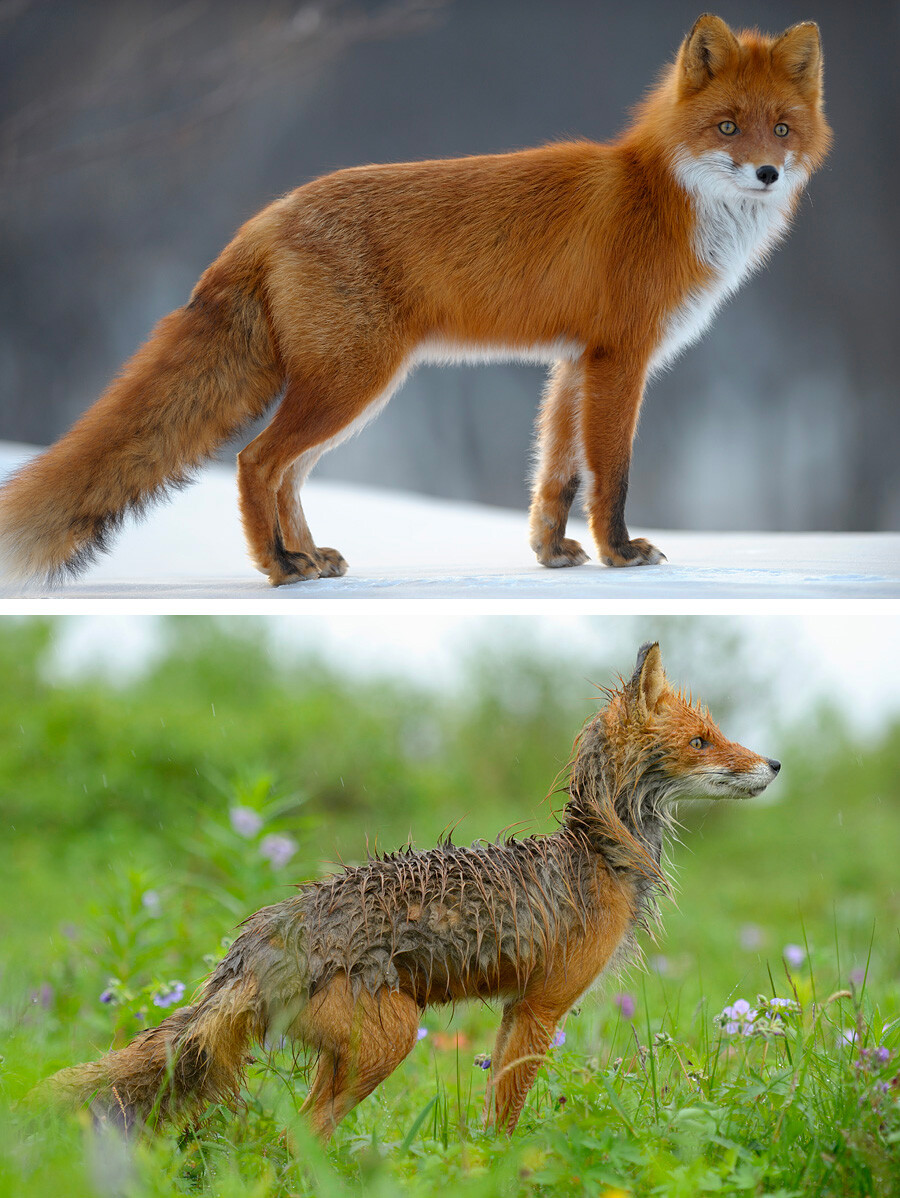
Alisa the fox: winter and summer style.
Igor Shpilenok10. Meanwhile, foxes have been making contributions to science, as well! In 2017, MSU biologists were studying the remains of ancient Bering gophers and sought to compare them with modern Kamchatka ones. One of the scientists saw Igor’s photos and asked if he could obtain several specimens for a genetic analysis.
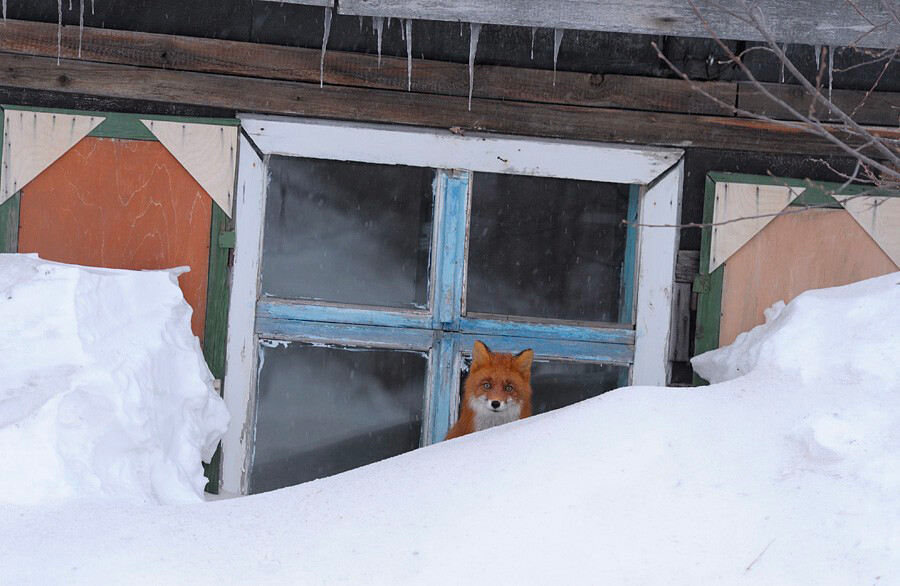
A fox by the izba.
Igor Shpilenok11. “Alisa would hunt these gophers for her cubs and I was devising a way to ask her to surrender some for me. When I saw her with the day’s catch, I took a candy from my pocket and began eating it delightfully. Alisa became interested and laid down the gopher. I gave her a piece of the candy and she took it. The following day, she raced toward me with a new gopher and I, again, gave her half a candy. It took me a week to collect the necessary specimens for the scientists, while the fox continued to bring me new gophers, laying them on the porch in rows. And when the business went south and the candy stopped coming, she was very disappointed.” However, ‘Scientific Reports’ magazine would go on to express their gratitude for the fox for collecting the materials for research, writing: “We are very grateful to Alisa, the fox who ‘collected’ the first specimens from Kamchatka for this study and ‘presented’ them to Igor Shpilenok.”
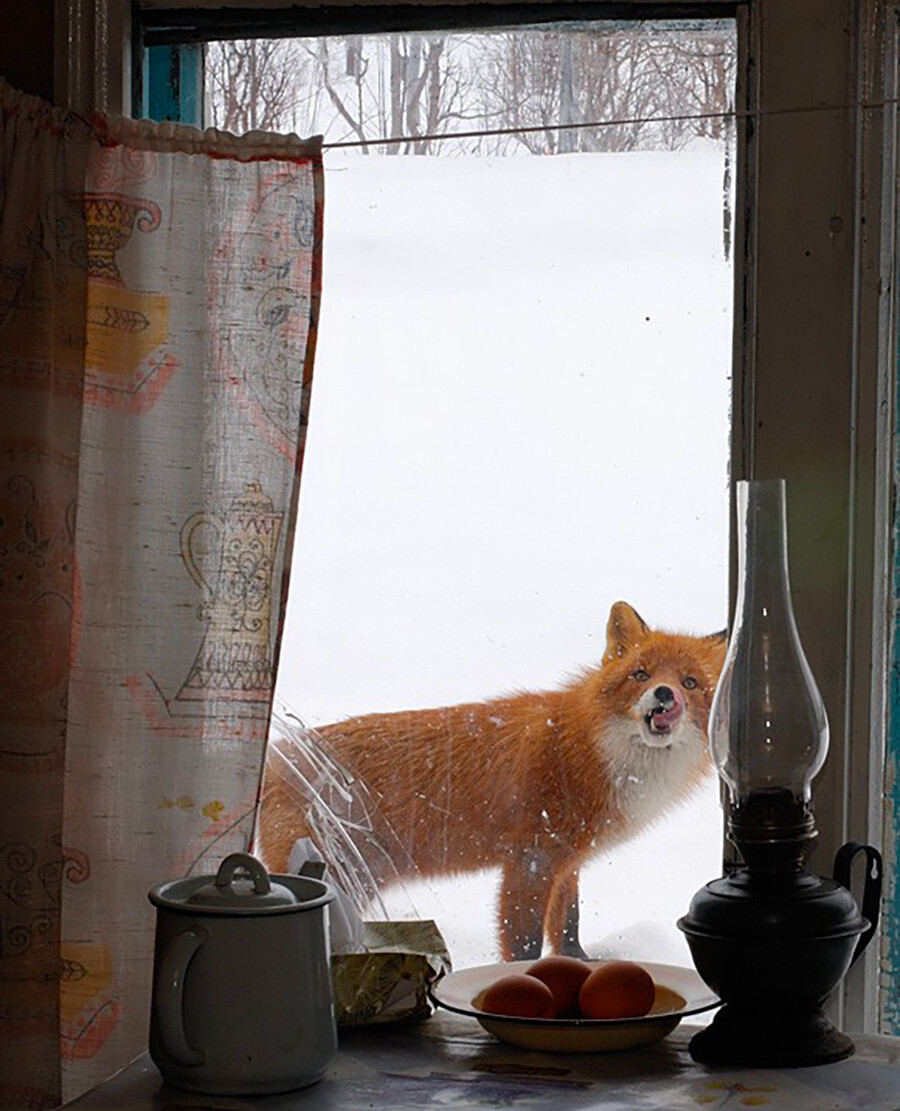
A fox by the window.
Igor Shpilenok12. One time, Igor took his pet cat Ryska (‘Lynx’) on an expedition to the Kronotsky nature reserve for five months, as he had no one to leave her with. Foxes, meanwhile, developed a habit for visiting his home, having been very excited by the smell of fried eggs, cooked using pork fat. They even line up, just to get a whiff of the good stuff.
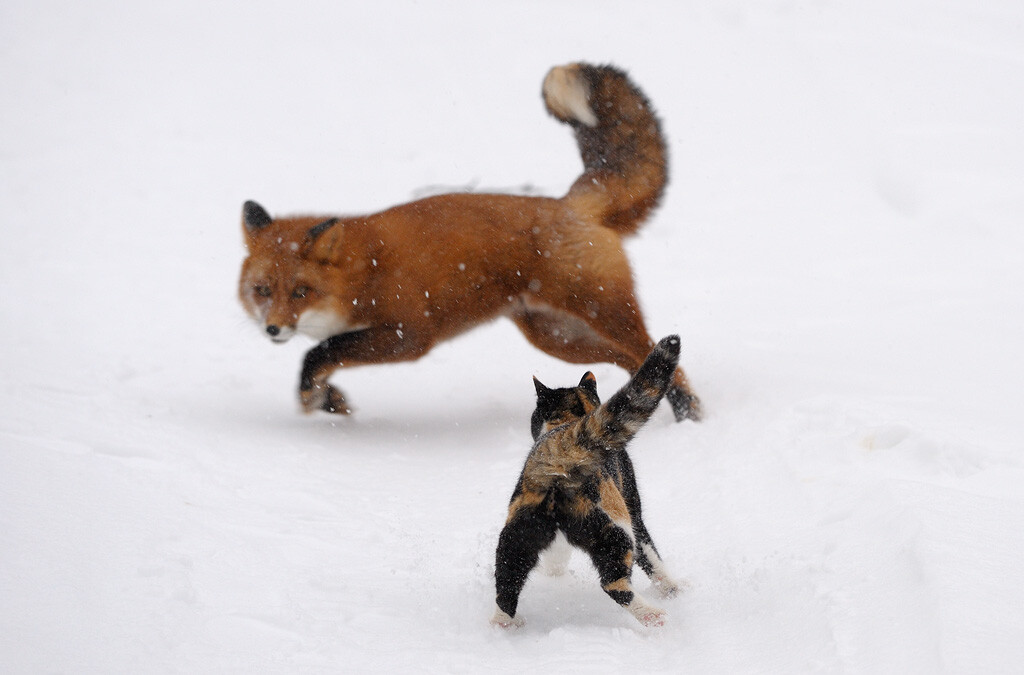
Ryska the cat chasing away a fox.
Igor Shpilenok13. Of course, the cat was outraged by the audacity and began to go after the foxes. It’s true what they say: there’s no scarier animal than a cat. Just look at the fear in the foxes’ eyes. “Of course, she’d only chase the foxes away when the owner was nearby, as foxes are wild, and can get out of control.”
The following shot won a Wildlife Photographer of the Year award in 2009, in the ‘Urban and Garden Wildlife’ category.
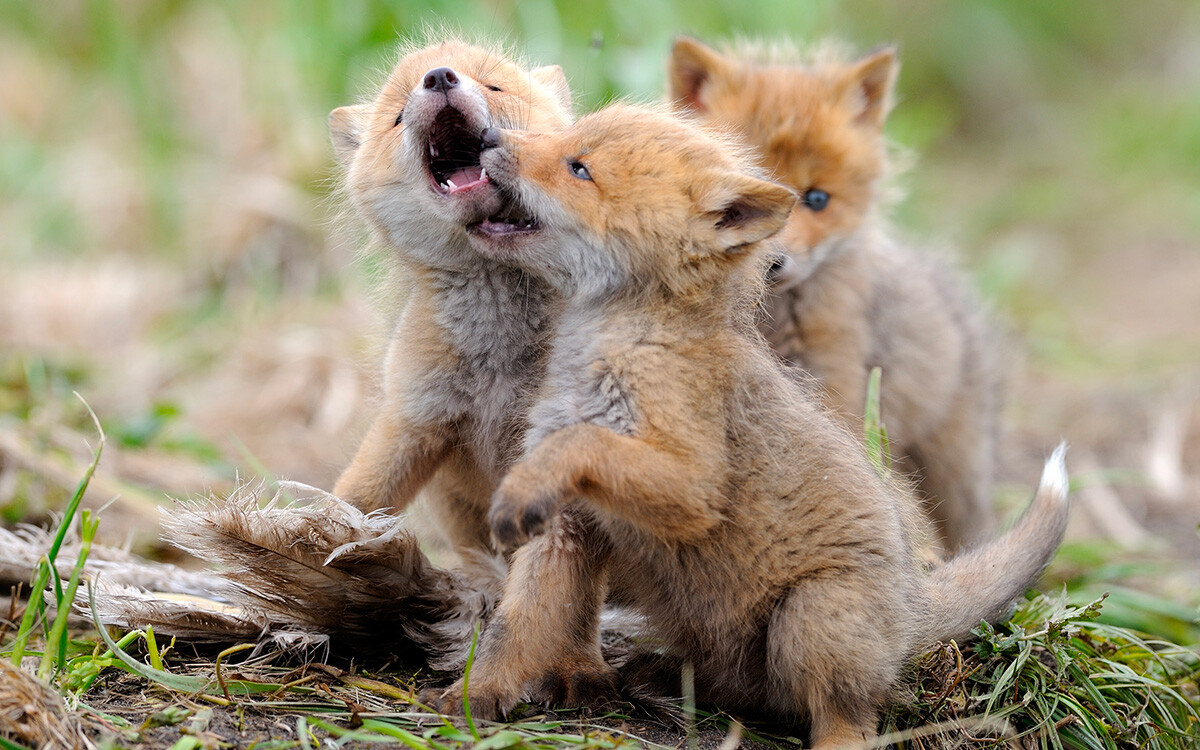
Fox cubs.
Igor Shpilenok14. In the long years he’s been doing safaris and living in the woods, Igor came across a great many foxes, capturing their lives - oftentimes difficult, tough, full of dangers and fighting for survival. “At first, it might seem that they’re all the same,” he says. “But they’re different in their behavior, personalities and some have unique scars.”
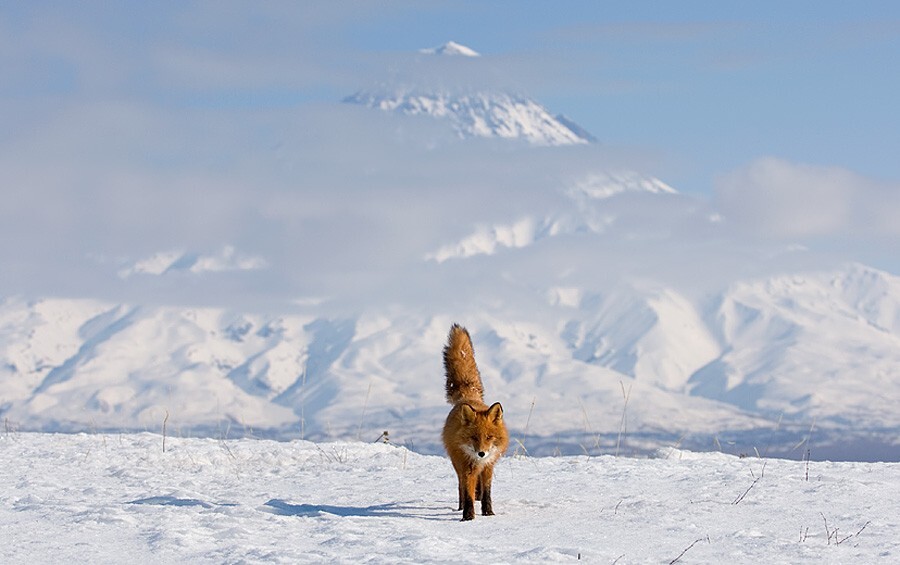
A fox by the volcano.
Igor Shpilenok15. The Kamchatkan Zlodey Zlodeyich became a father to several cubs, but his life was cut short after he got tangled up in the remainder of a fishing net. His neighbor, Alisa, lived to be nine years old and her offspring ended up bearing a striking resemblance to her. Patrick, from Bryansk, meanwhile, was a favorite with local photographers: he would often venture into buffalo territory and, one day, he was never seen again.
Dear readers,
Our website and social media accounts are under threat of being restricted or banned, due to the current circumstances. So, to keep up with our latest content, simply do the following:
If using any of Russia Beyond's content, partly or in full, always provide an active hyperlink to the original material.
Subscribe
to our newsletter!
Get the week's best stories straight to your inbox